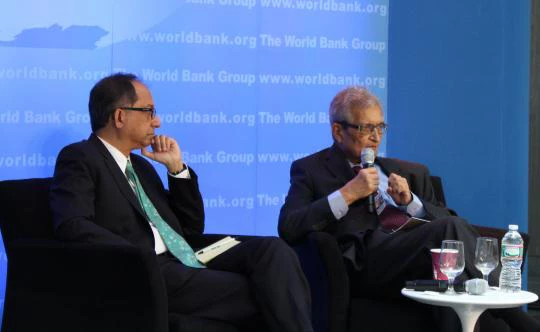'Why is China Ahead of India? Implications for Europe and the US,' was the topic of a talk yesterday at the World Bank by Nobel winner Amartya Sen which was chaired by Kaushik Basu. In the span of just under two hours, Sen managed to pinpoint India's main Achilles Heel (primarily related to the low overall quality of education, poor health care and skewed energy and other subsidies), while weaving in references to Kido Takayoshi, Mao Zedong, David Hume, Mahatma Gandhi, Adam Smith, Jon Stuart Mill, Milton Friedman, Keynes, Marx and other thinkers and influencers. 
Following the talk, there was a lively question and answer session. Some in the audience had questions related to how to speed development by expanding what Amartya describes in his op ed as ‘the bottom of the socioeconomic pyramid.’ This part of the event was especially helpful, since questions posed were in many cases relevant to the two new goals set recently by Bank Group President Jim Yong Kim. Indeed, if we are to get extreme poverty down to 3 percent or lower by 2030 and if we are to improve the wellbeing of the lowest 40 percent of each country’s population by the same deadline, we need ambitious solutions for reaching poor people and for ensuring that wealth is spread more widely so that lower middle class people can enjoy the fruits of growth and prosper.
Amartya referred in his answers to issues such as the returns from national immunization programs versus efforts to tackle undernourishment. His insights regarding politics, famines, the messiness of democracy, and the fragilities inherent in a nondemocratic system were valuable indeed, especially since such a large share of the developing world’s population resides in India and China and the planet's future outlook rests in no small part on the fate of those two great nations.
To watch the full talk as well as the lively question and answer session, click here.


Join the Conversation